RRP players are offered the best deals in the following reservations:
- Italy;
- USA;
- Sweden;
- Asia;
- Soth America.
Poker rooms are available for playing with the Italian ip:
- Tribo Poker (RAP)
- Angrybet
- Chinese poker applications: Poker Master, Hi Poker, Molly`s Game, Super Poker, PokerKing Asia, PPPOKER, Win Poker, Card Club, Face Poker, Fish Poker, Poker Clans, Red Dragon
- Italian rooms: Planetwin365.it, People`s.it, iPoker.it, Bossmedia.it, Bwin.it, 888.it
- Bitcoin rooms: Nitrogen Sports, SWC Poker, Cryptopoekrclub
- Israeli Rooms: Club Poker, Gold Poker Pro, Poker247, Poker717, Royal Diamond, Pure Play Poker
- American Clubs: Kingsclubpkr
- J88 Poker
- Klas network
Action on the HU tables:
- Tribo Poker (RAP)
- Chinese poker applications: Poker Master, Hi Poker, Molly`s Game, Super Poker, PPPOKER, Win Poker, Card Club, Face Poker, Fish Poker
- Italian rooms: Planetwin365.it, People`s.it, iPoker.it, Bossmedia.it, Bwin.it
- Bitcoin rooms: Nitrogen Sports, SWC Poker, Cryptopokerclub
- Israeli rooms: Club Poker, Gold Poker Pro, Poker247, Poker717, Royal Diamond, Pure Play Poker
- American Clubs: Kingsclubpkr
- J88 Poker
If your ISP blocks access to a particular poker resource or poker client, you can use some simple solutions to solve the connection issue.
One of the easiest ways to access Internet resources is the use of browsers for anonymous visits to poker sites:
- Tor;
- Opera in turbo mode or there is a built-in free VPN.
In addition, you can install plug-in extensions:
- Hola;
- Fri-gate;
- ZenMate;
On the poker site or in the poker client you can log in using one of the VPN services:
- Hideme - one day free (test mode);
- CyberGhost;
- KINGSHANDS;
- Windscribe.
You can start to play before you get a confirnation about your account is tagged correctly, but RedRum Poker managers cannot guarantee getting all promised benefits from us.
We appreciate the loyal grinders who advise RRP to their friends. We have a regular promo called "Refer a friend". For details, see the "Promo" section or simply click here.
You have to fill special form for "VIP deal selection". Or click on the deal`s page button "Request the Deal"
P.S. "VIP deal selection" can be found at the bottom of the site page. Just click on the icon "VIP"
Disclosure of the terms of the deal with RedRum Poker to third parties is strictly PROHIBITED! This is a violation of the unspoken agreement on cooperation between the player and the affiliate. In case of detection of such violations by the player, we break all existing agreements unilaterally.
Learning how to play Texas Hold'em can seem much more difficult than it really is.
The rules of Texas Holdem are actually very logical and simple and require just a few minutes to learn.
Mastering Texas Holdem, however, will take you a bit longer.
Texas Holdem Rules
If you're just getting started learning the rules of Texas Holdem, Keep this guide handy for quick reference. Anytime you get confused by the action, read below for some guidance. Each topic contains links to more in-depth articles on that specific aspect of the Texas Holdem rules.
When you feel you've got the hang of it and are ready to play for real be it in online poker or live, check out our Texas Hold'em toplist for the best places to get right into a Texas Holdem game online..
Before we get into describing the rules and game play, here's a quick glossary of Texas Holdem terms you'll encounter.
- Blinds: Short for "blind bets," these are the forced bets made before the cards are dealt. In Hold'em, blinds take the place of the classic "ante."
- Button: Nickname for the player acting as the dealer in current hand.
- Check: Similar to a call but no money is bet. If there is no raise preflop, the big blind may check.
- Flop: The first three community cards dealt.
- Fourth Street: See Turn.
- Fifth Street: See River.
- All-In: A player puts all of his or her remaining chips into the pot
- Preflop: Anything that occurs before the flop is dealt is preflop.
- River: The final (5th) community card dealt; also known as fifth street.
- Showdown: When players reveal their hands to discover the pot's winner.
- Turn: The fourth community card dealt; also known as fourth street.
How to Play Texas Hold'em
Texas Hold'em is a community card poker game with game play focused as much on the betting as on the cards being played.
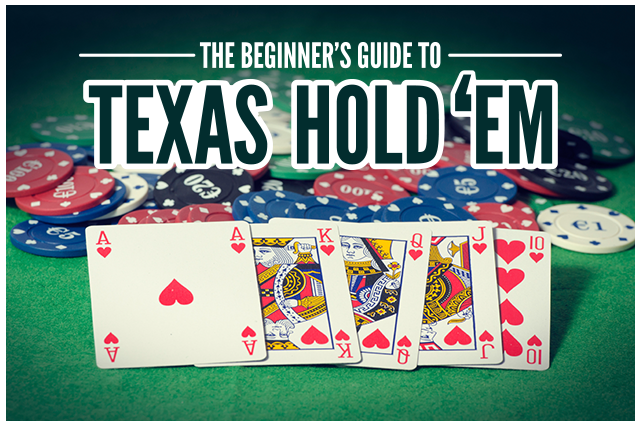
Although the rules and game play are the same the end goal is slightly different depending on if you're playing a Texas Holdem cash game or a Texas Holdem tournament.
A Texas Hold'em tournament is the same as any other game of Hold'em with a few added rules and twists. Learn more about the rules unique to Texas Holdem poker tournaments here. (There will also be a link at the bottom of the page).
A Texas Holdem cash game is played on a single table with two to 10 players. The goal is simple: win as many chips as you can, one pot at a time. You win a pot by having the best hand or by having all other players fold before the showdown.
A Texas Hold'em game can be broken up into three main parts:
- Setup;
- Betting Rounds;
- Showdown.
Texas Holdem - Picking a Dealer
Once you have your players sitting around the table, the first thing you need to have is chips. Before you can figure out what kind of chips to give each player, you need to understand how the game works a little better, so we'll get back to this.
For now, assume all players have chips in front of them.
The next step is picking the player who will start with the dealer button. Hold'em is played with what's known as a rotating dealer, meaning a player will act as the dealer for one hand, handing the role of dealer to the player on their left when the hand is completed.
To choose the dealer, either deal every player one card or spread the cards facedown on the table and have every player choose one. The player with the highest-valued card (aces are high for selecting a dealer) starts as the dealer.
If you're in a place with a professional dealer (or someone volunteers to always physically deal the cards) the dealer button will still rotate around the table. Even though he or she is physically dealing the cards, for all intents and purposes, the person with the button is viewed as being the dealer for the hand.
Once the hand completes the player with the dealer button will pass it to the player on his or her left.
Putting Out the Blinds
Now that you have a dealer, you need to put out the blinds. There are two blinds in Texas Holdem - a small blind and a big blind. The player directly to the left of the dealer puts out the small blind.
The big blind (usually double that of the small blind) is placed by the player to the left of the small blind. The size of the blinds will dictate the stakes of the game you're about to play.
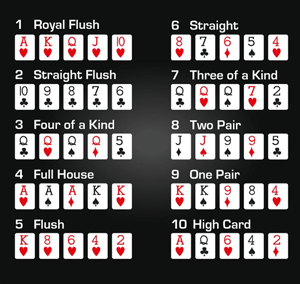
Typically, you want players to buy in for no less than 100 times the size of the big blind.
If you want to buy in for $20 you should play with blinds of 10¢/20¢. For convenience, most people will play 10¢/25¢.
Back to chips: Once the blinds are set we know what kind of chips we'll need to play. (In the above example, we'd use 10¢ chips, 25¢ chips and maybe a few $1 chips.)
You want to give players enough chips in each denomination to allow the game to run smoothly.
Typically a player will need only 10% of their total chips in the smallest denomination, as they are only ever used to pay the small blind. For the most part, all betting will be done with chips larger than that of the small blind.
Once you have the blinds out, you're now ready to deal the first hand.
Texas Holdem Betting Rules
The person dealing the cards deals to the left of the player with the dealer button first and rotates clockwise around the table giving each player one card at a time until each player has two cards. These are known as your hole cards.
A round of Texas Hold'em consists of a minimum of one and a maximum of four betting rounds. A hand ends when all players but one have folded or the fourth and final betting round completes with multiple players still in the hand - whichever comes first.
At that point players enter into the showdown (to be explained in the next section) and the player with the highest hand takes the pot. If two players share the highest hand the pot is split equally between them.
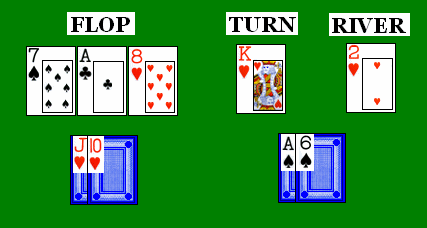
Texas Holdem Betting Rules - Pre-Flop
When all players receive their hole cards you're now in the pre-flop betting round. Each player looks at his or her cards and decides what action to take. In Hold'em only one player can act at a time.
The pre-flop betting round starts with the player to the left of the big blind. This player has three options:
- Fold: Pay nothing to the pot and throw away their hand, waiting for the next deal to play again.
- Call: Match the amount of the big blind.
- Raise: Raise the bet by doubling the amount of the big blind. A player may raise more depending on the betting style being played.
Once a player has made their action the player to the left of them gets their turn to act. Each player is given the same options: fold, call the bet of the player to their right (if the previous player raised, that is the amount you must call) or raise.
A raise is always the amount of one bet in addition to the amount of the previous bet, for example: if the big blind is 25¢, and the first player to act would like to raise, they put in a total of 50¢ (the big blind + one additional bet).
If the next player would like to re-raise they would put in a total of 75¢ (the previous bet + one additional bet). A Texas Holdem betting round ends when two conditions are met:
- All players have had a chance to act.
- All players who haven't folded have bet the same amount of money for the round.
Example Betting Round 1
There are five players at the table:
Player 1 - Button
Player 2 - Small Blind (10¢)
Player 3 - Big Blind (25¢)
Start of betting round
Player 4 - Calls the big blind (25¢)
Player 5 - folds
Player 1 - Calls the big blind (25¢)
Player 2 - Calls the big blind (since they already have 10¢ bet, they only have to add another 15¢, for a total of 25¢)
Player 3 - Checks (since they already have the bet matched, they do not need to add more money to call; this is called checking)
End of betting round
When Player 2 calls the big blind, all players now have the same amount of money in front of them, but Player 3 (the big blind) has not had a chance to act so the betting round is not over.
Once Player 3 checks, both conditions are met and the betting round is over.
Example Betting Round 2
There are five players at the table:
Player 1 - Button
Player 2 - Small blind (10¢)
Player 3 - Big blind (25¢)
Start of betting round
Player 4 - Calls the big blind (25¢)
Player 5 - Raises (50¢)
Player 1 - Folds
Player 2 - Folds
Player 3 - Reraises (they already have 25¢ in as the big blind. They complete the bet of 50¢, and add one additional bet for a total of 75¢)
Player 4 - Folds (their previous call of 25¢ is now in the pot)
Player 5 - Calls (matches the bet of Player 3 for a total of 75¢)
End of betting round
In this scenario all players had had a chance to act when Player 3 made the re-raise. But all players did not have the same amount of money bet.
Once Player 4 folds, only Player 3 and Player 5 are left in the pot. When Player 5 calls, both conditions are met, and the betting round ends.
Texas Holdem Betting Rules - The Flop
Once the preflop betting round ends the flop is dealt. This is done by dealing the top card in the deck facedown on the table (it becomes the burn card), followed by three cards face-up in the middle of the table (see below).
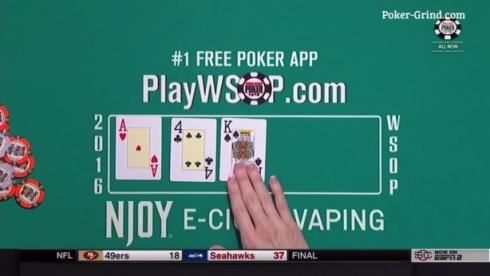
Once this has been dealt the first post-flop betting round begins. The rules of a post-flop betting round are the same as a preflop with two small exceptions:
- The first player to act is the next player with a hand to the left of the dealer
- The first player to act can check or bet; as there has been no bet made, calling is free.
A bet on the flop is the amount of the big blind. In our game as described above, a player must put out 25¢ to make a bet.
Texas Holdem Betting Rules - The Turn
Once the betting round on the flop completes, the dealer deals one card facedown followed by a single card faceup, also known as the "burn and turn." Once the turn has been dealt the third betting round starts.
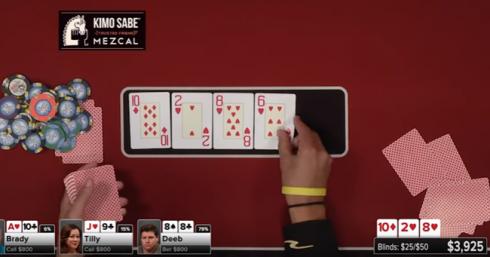
The third betting round is identical to the flop betting round with one single exception: The size of a bet for this round, and the final betting round, is doubled, meaning that to make a bet in our game will now cost a player 50¢.
Texas Holdem Betting Rules - The River
Assuming more than one player is left having not folded on one of the previous streets, the river is now dealt. Dealing the river is identical as dealing the turn with one card being dealt facedown followed by a single card face-up.
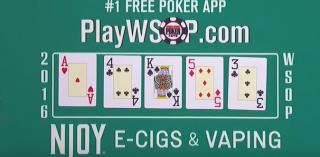
This is the final street and no more cards will be dealt in this hand. The betting round is identical to the betting round on the turn.
Miscellaneous Texas Holdem Rules
Raising
- A player must either declare their intent to raise verbally before making any actions or bring the amount of chips equal to the total amount of their raise into play at the same time. A player is not allowed to place chips, return to their stack and place more chips. This is known as a string bet.
- Solutions to any other random situation you come across can be found here.
Buying Chips
- The minimum number of chips a player is allowed to buy before their first hand dealt is determined by the house rules governing the game. Typically a minimum is 50-100 times the big blind.
- There is no maximum to the number of chips a player may buy at any time.
- In a cash game a player may reload, or add more chips to their stack, at any time between hands. Once a hand is started, a player may only use the chips they had in play at the beginning of the hand, during that hand. Any additional chips will not be "in play" until the next deal.
Omaha poker is rapidly gaining fans worldwide and is now easily the second-most played poker variation in the world.
It's easy to see why. It's an awesome game filled with tons of action and high-level strategy.
There's also a very natural similarity to Texas Hold'em which makes learning how to play Omaha easy for most players.
The big action Omaha is known for makes the game incredibly exciting and infinitely more interesting to both beginners and professionals alike.
If you already know Texas Hold'em Rules and Game Play, you know how to run and play a game of Omaha more or less. So let's get started!
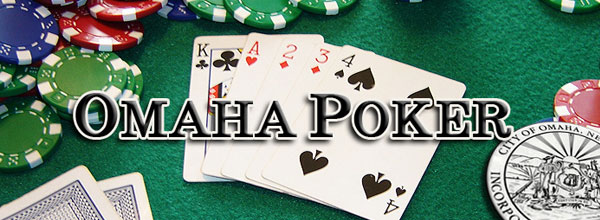
How to Play Omaha Poker in 20 Easy Steps
1. Two Differences between Hold'em and Omaha
- Every player gets four cards in Omaha (instead of two in Hold'em)
- You MUST use two of them to make your best poker hand hand
2. How to Win a Hand
Omaha is a community-card game played with two to ten players on one table. You win chips by winning a pot and you win a pot in one of two ways:
- All the other players fold their hands, making you the only player left in the pot.
- You have the best hand at the showdown.
3. Draw for a Dealer
When you have 2-10 players at the table, each with a stack of chips, you're ready to start. The first thing you need to do is draw the high card for a dealer.
Deal every player one card face up. The player with the highest ranked card (Aces are high) will start as the game's dealer. If two players both have the same high card, either deal both players a second card, or use the suits of their card to determine the winner. (Poker suit ordering is alphabetic from worst to best: Clubs, Diamonds, Hearts, Spades).
4. Put Out the Dealer Button
When you have a dealer, give that player the dealer button (typically a white disk) used to keep track of the current dealer in the hand. This player needs to shuffle up the cards and prepare to deal the first hand.
5. Put Out the Blinds
Before the cards are dealt in any hand the two players to the left of the dealer need to put out the blinds. The player directly to the left of the dealer puts out the "small" blind and the player to the left of the small blind puts out the "big" blind.
Eg. small blind is 5c, big blind is 10c.
6. Deal the Cards
Once the blinds are out, the dealer can deal the cards. Start with the player to the dealer's left (the small blind) and move clockwise around the table. Each player is dealt one card at a time (face down) until all players have exactly four cards.
7. Start the First Betting Round
Once the last card is dealt and every player has four cards face down, you are now in the first betting round known as "preflop." A betting round ends when two conditions are met:
- All players have had a chance to act.
- All players who haven't folded have bet the same amount of money for the round.
In poker only one player can act at a time, starting at the player to the left of the big blind. This player has three options:
- Fold: Can pay nothing to the pot, throw away his or her cards and wait for the next deal to play again.
- Call: Can match the amount of the big blind.
- Raise: Can raise the bet by at least doubling the amount of the big blind. A player may raise more depending on the betting style you are playing.
8. Continue the Action Clockwise
Once the player to the left of the big blind acts, the action moves clockwise around the table. Each player has the same options: fold, call or raise.
The amount of a call or raise is always dependant on the size of the last bet made.
For example, for the first player to call he or she needs to match the size of the big blind. If he or she raises it has to be double the big blind. If ther is a raise the next player has to add the full amount of the big blind + the raise to call.
9. Big Blind is Last to Act Before Flop
When the action gets back to the small blind he or she can fold, call or raise just like everyone else. If a raise has been made to 50¢ and the small blind has already paid 5¢, he or she only needs to add 45¢ to call.
If there has been no raise and the current bet is still the same as the original big blind of 10¢, the big blind can check and continue in the hand. If a rasie has come in he or she needs to add the amount less the original 1010¢
Once everyone has had a chance to act and everyone still with a hand has the same amount of money wagered, the pre-flop betting round is over.
10. Deal the Flop
Once the preflop betting round is concluded the flop is dealt. In a community-card came such as Omaha, there will be five community cards total for any hand reaching a showdown. The flop is the first three of the five cards dealt.
The dealer discards the top card on the deck face down (this is called the burn card) and then deals three cards face up in the middle of the table.
11. Start Next Betting Round With Player Left of Dealer
After the flop is dealt the next betting round starts on the first player to the left of the dealer still with a hand (players with a hand are known as "live players").
This player is in a similar situation to the big blind preflop. He or she can check or bet. The player is not required to add any money to call and they do not need to fold either. A bet in this round is typically equal to the same amount as the big blind.
12. Continue to Next Player to the Left
Action moves to the next live player to his or her left with the same options available: check (if no bet before), call (match a previous bet), raise (add another bet on top).
13. Deal the Turn
Once the flop betting round is complete the dealer deals the turn. The card at the top of the deck is discarded face down face (another burn card), and one card is dealt face up next to the flop.

14. Start Next Betting Round
Once this is done the next betting round starts.
The turn's betting round is exactly the same as the flop's with one exception. A single bet on the turn now uses the larger betting limit. Typically the larger betting limit is double the size of the big blind.
Sometimes, mostly for convenience, the large betting limit is slightly larger than double the big blind. This is most common in games such as a $2-$5 Limit game.
15. Deal the River
Once the turn betting round is complete the final community card is dealt. The dealer discards one final card face down, followed by one card face up.
16. Start Final Betting Round
Once the river is dealt the final betting round of the hand begins.The river's betting round is identical in all ways to that of the turn.
17. Enter the Showdown
When the river betting round has been completed all remaining live players enter into the showdown. The concept of the showdown is simple: the player with the best hand wins the pot.
18. How to Determine the Winning Hand
Evaluating a winning hand in Omaha is slightly different than in Texas Hold'em.
The first thing you need to know is still the same though - the poker hand rankingorder. Some guidelines for evaluating an Omaha poker hand:
- There are no other hands used in Omaha than the hands listed in this chart. For example, having three pairs is actually only "two pair" with the highest valued two pairs making your hand.
- In Omaha players must use exactly two cards from their hand and three cards from the community cards to make the best hand possible.
- The player can use any two of his or her four cards and any three of the five community cards. For example:
- if the board is 2♥ J♣ Q♣ K♠ A♦
- Player 1 holds 10♠ 9♣ 9♥ 2♦
- Player 2 holds 10♣ 2♣ 3♥ 4♥
In this pot only Player 1 has a straight (9♣ 10♠ J♣ Q♣K♠). Player two must use two cards from his hand giving him no more than a pair of twos (2♣ 2♥ A♦ K♠10♣).
- If all remaining players have nothing, no pair or anything stronger, the winning hand is the hand with the highest valued single card, meaning:
- A♣ 3♥ 4♦ 6♠ 7♠ is a better hand than K♠ Q♠ J♣ 9♣ 8♦
- A♣ J♥ 9♠ 8♦ 6♥ is a better hand than A♥ J♣ 9♦ 8♣ 2♠
Because of having to use two cards out of your hand, if the board is a straight (A♦ 2♣ 3♥ 4♦ 5♣) you will need two of your own cards to fit into that straight to have a straight as your hand.
For example: 6♠ A♣ K♥ K♠ does not have a straight - the best hand they can make would be a pair of aces. 2♥ 3♣ Q♠ Q♦ does have a straight, being able to substitute their 2 and 3 for the 2 and 3 on the board.
- Suits are never used to evaluate the strength of a hand.
19. Push the Pot to the Winner
Once you have discerned the winning hand, that player wins the entire pot. When a pot is won the hand is complete.
20. Pass the Dealer Button to the Left; Start Over!
After the hand completes the dealer passes the dealer button to the player to his or her left.
At this point you begin the next hand with the two players to the left of the new dealer putting out their blinds.
Some Extra Omaha Poker Notes
- Omaha is played in either Limit or Pot-Limit betting structures.
- Omaha should not be played as a No-Limit game. The game is inherently action crazed so a strict betting structure helps keep order in the game.
- Omaha can also be played as a Hi-Lo split game, To learn the rules and game play for Omaha Hi Lo head to this article here.
If you need more detail on anything in this guide such as:
- How to decide the denominations of chips you should use.
- How to pick the stakes of your game (set betting limits).
- More details on how betting, raising and calling works.
- Glossary of poker terms used in this guide.
Open-face Chinese poker (OFC)
Like other poker games, OFC players take turns drawing cards from a single deck, trying to make the best possible hand, while their competitors do the same. Unlike other poker games, however, there are no bets placed during the rounds of play. Instead, the players agree to play “per point” and the game is scored in points, similar to card games like hearts or gin rummy.
After all card-placement rounds are complete, each player will have arranged 13 cards into three hands, called the “top,” the “middle,” and the “bottom.”
Each player’s top hand is compared to his or her opponents’ top hand, the middle to the middle, and the bottom to the bottom. A player will win or lose points, based on how his or her hand measures up.
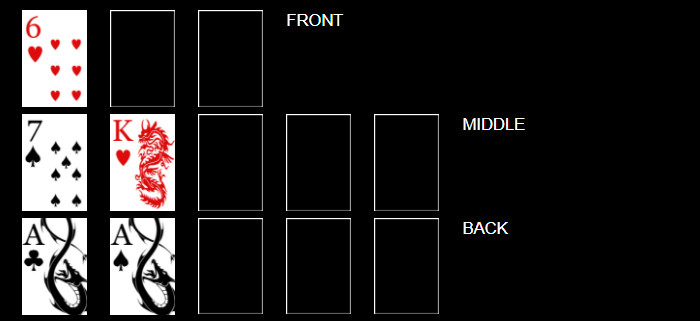
The three hands are scored and compared as regular poker hands. The bottom and middle are regular five-card hands. The top only contains three cards, but is scored the same way, thus the best possible hand on top would be three-of-a-kind, while most top hands are high-card hands.
Since each player need 13 cards from the deck, OFC is played with a maximum of four players. Most commonly, the game is played heads-up between just two opponents.
First Round & Subsequent Rounds
Like hold’em games, OFC is played with a dealer button. The player to the left of the button acts first on every street, the action moves clockwise, and the button moves after every hand.
At the start, players get five cards to play in turn, playing each card top, middle, or bottom. The cards are arranged face-up on the table, hence “open-face” Chinese poker. Once a player arranges the cards and indicates that his or her turn is complete, the next player flips over all five cards and starts their own arrangement.
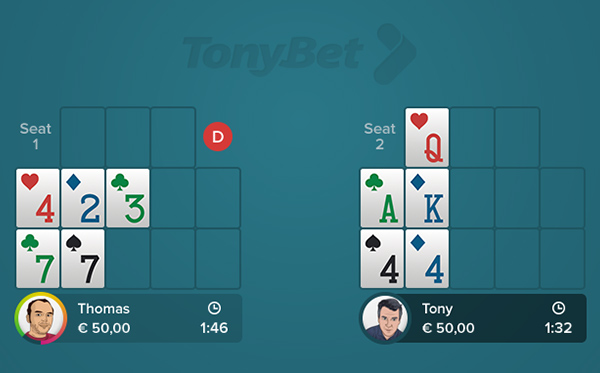
After the first turn, players get cards one at a time, and play them face up, in turn.

Once you play a card top, middle, or bottom, you can’t move it to a different row later. There are no take backs.
If you have read this far, and are familiar with the basics of poker hands (a flush beats a straight, quads beat a full house, etc.), then you are ready to play OFC. As long as you trust your opponent, or an impartial judge, to score the hands, go ahead and get a game started.
Scoring
The basics of scoring are simple, but there are a number of detailed cases to account for. Don’t get overwhelmed. Like casino slots or Candy Crush, you can start playing the game without knowing all of the scoring details right away and learn as you go.
OFC is played per point, so scoring of the final hands (after all 13 cards are placed) is done on a point basis.
Each row, (top, middle, and bottom), is worth one point to the winner. So if you have a pair of jacks in the middle and your opponent has king high, then you win one point in the middle.
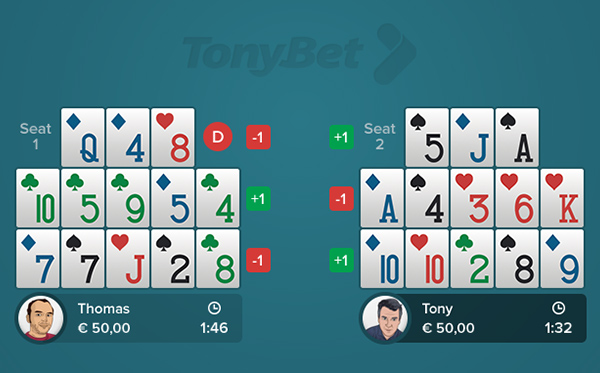
In this hand, "moscow25" wins the bottom and top rows, but loses the middle row. Therefore, he wins one point overall.
If playing OFC three- or four-handed, each player scores against each player independently. Thus, unlike in hold’em, where the best hand that doesn’t fold gets everything and everyone else gets nothing, there is no folding. For example, if Bob beats Ted but loses to Joe, Bob still wins points from Ted.
But wait, there’s more!
In addition to the +1/-1 points per row, there are a myriad of scoring bonuses that can be worth a lot more than one point.
Scoring Bonuses
The most common OFC scoring bonus is the “scoop bonus.” If you beat an opponent's top, middle, and bottom, you win an additional three points. This is sometimes referred to as the “1-6” scoring system. If you beat your opponent two out of three rows, you win one point overall. If you scoop him, it’s worth six points overall.
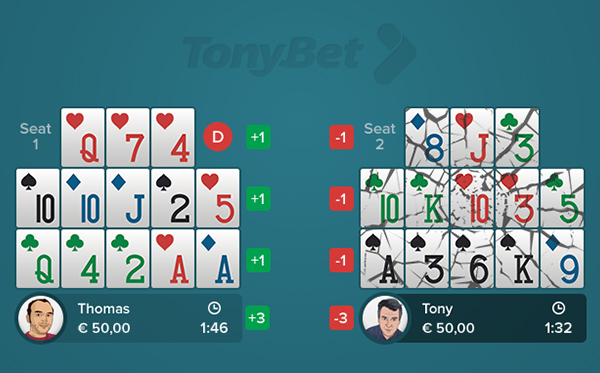
To encourage players to take chances for big hands, OFC rewards good hands in every row with different point bonuses. These bonuses are given, as long as a player makes a qualifying hand, regardless of whether the hand wins or loses.
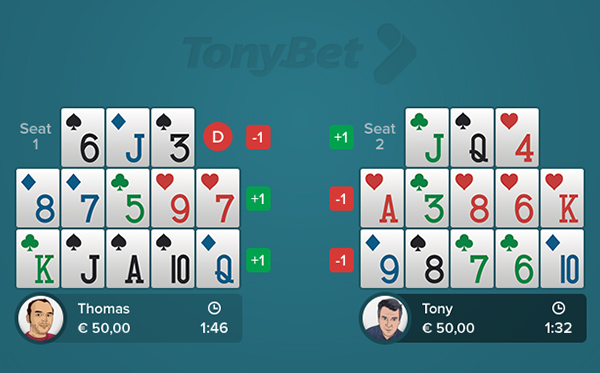
Here, "moscow25" makes a straight on the bottom, but loses to a his opponent’s bigger straight on the bottom. His opponent gets one point for winning the row, plus a two-point bonus for the straight. However, "moscow25" still gets two points for his straight. Therefore, the straight bonuses cancel each other out, and "moscow25" loses just one point on the bottom row.
Bonuses for bottom-row hands range from +2 for a straight to +25 for a royal flush. Middle bonuses start with +2 for three-of-a-kind, going up to +50 for a royal flush. Bonuses for the top hand start with +1 for a pair of sixes and then increase from there. The full list is below.
Royalties
In addition to the bonuses for big hands, there’s a special rule, which started out as another way to add drama to the game, but has since become a standard, big part of OFC strategy.
Playing with "Fantasyland” is optional, and must be agreed to before an OFC game begins. Most OFC games played online and in public casinos are played with the Fantasyland option. Make sure you know whether you’re playing with or without Fantasyland before you join.

Rules and Ethics
While it’s OK to quit the game or to get dealt out to take a smoke or a phone call at the beginning of an OFC hand, any hand started must be completed until scoring.
Since Fantasyland is treated as the extension of a previous hand, and the player in Fantasyland has a clear advantage, players at the table are not allowed to quit or skip the Fantasyland hand, if they played the hand that led to it. There is also a common-courtesy rule that asks the player in Fantasyland to announce that he or she is “staying” in Fantasyland.
House rules vary, but it’s also common for the Fantasyland player to set the hand face-down, and not change it before the other players start their round.
Withdrawal speed:
A - up to 24 hours
B - up to 72 hours
С - more than 72 hours
D - more than 5 days
Security:
A - absolutely safe brands, you can keep money without a fear
B - pretty safe brands, but not proven to be absolutely reliable yet. Or there is partial guarantee from RedRumPoker
С - poker rooms in risk categories. We do not guarantee anything and players must carefully balance the advantages and disadvantages before playing in a these rooms
D - we simply don't have that ))
Weak players:
A - 20bb+/100
B - regulars are present, but the amount of fish is enough for good profit
C - number of regulars is huge
D - poker`s dead?